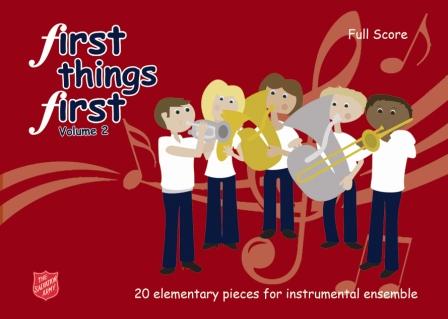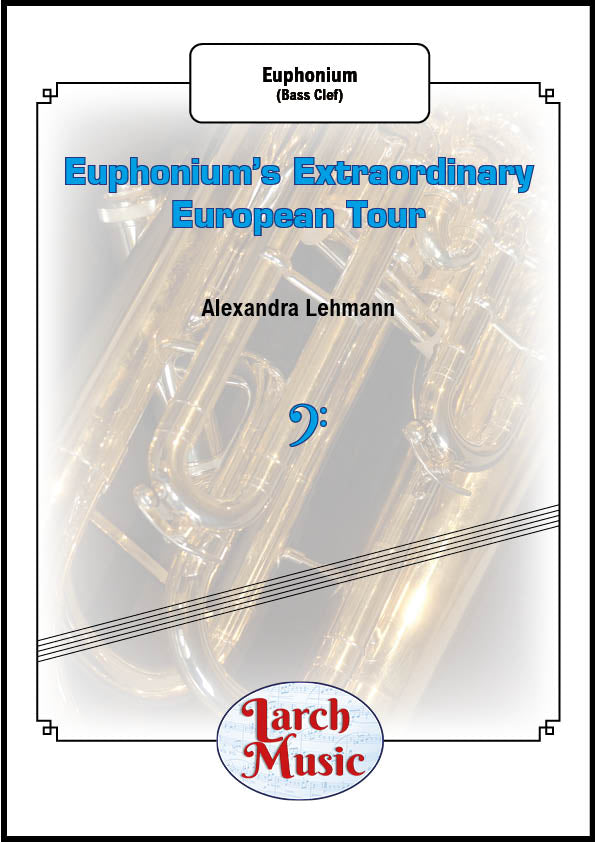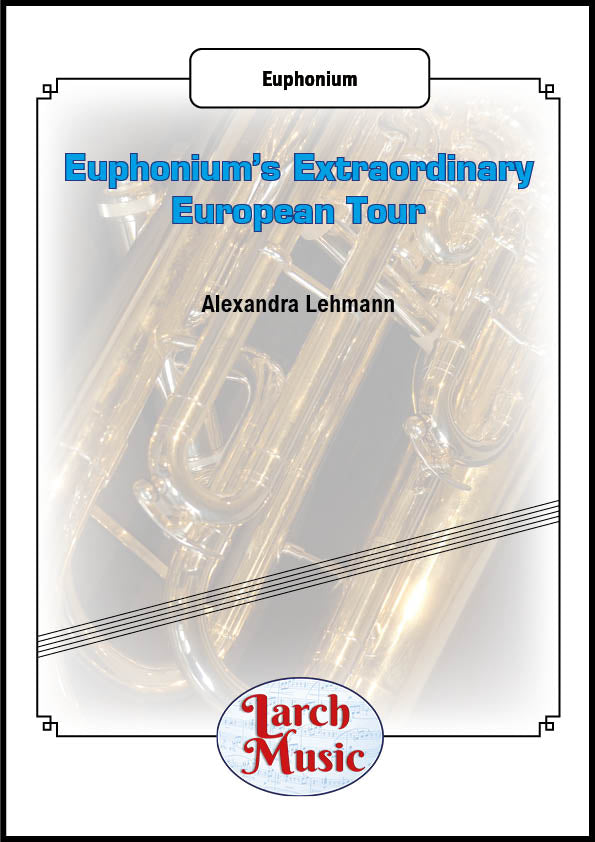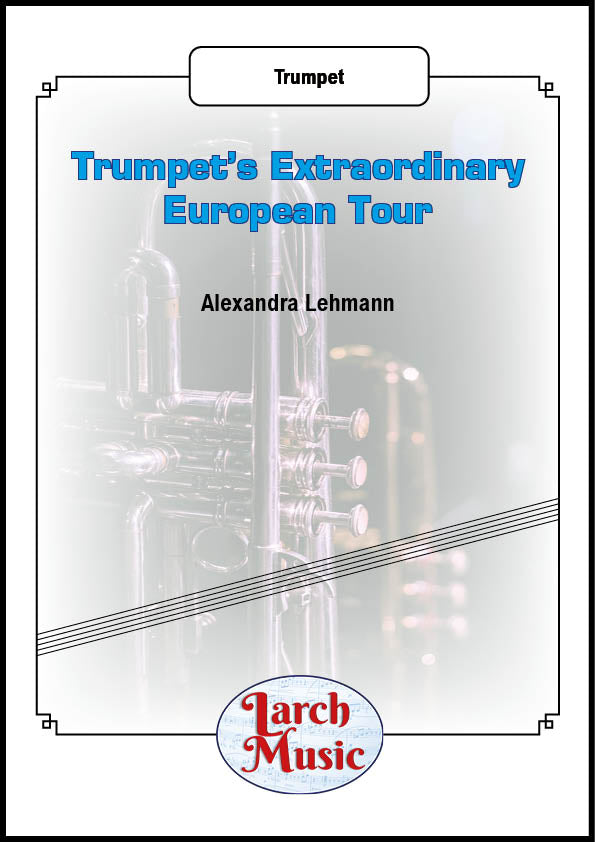Results
-
 £19.95
£19.95First Things First Vol.2 Full Score
Following the success of Volume 1, here is Volume 2 containing 20 new pieces:Chorus Arrangement - Clap your Hands (Derick Kane)Easter Intrada (Nicholas Samuel)Father, we adore you ((Ralph Pearce)March - Give thanks to the Lord (Trevor Davis)Happy all the time (Martin Cordner)March - Hold On! (Erik Silfverberg)Holy Ground (Trevor Davis)Prelude - In this place (Nicholas Samuel)Marching Saints (Ralph Pearce)New Life (Ray Steadman-Allen)Intrada - O come. all ye faithful (Andrew Blyth)Send the Fire! (Erik Silfverberg)Soon and very soon (Derick Kane)March - Stand up for Jesus (Noel Jones)Song Arrangement - Thank You! ((Andrew Blyth)The Lord's my shepherd (Ray Steadman-Allen)There is a redeemer (Dean Jones)We give thanks (Ralph Pearce)Winter's Rock! (Andrew Blyth)Wonderful Lord (Martin Cordner)
Estimated dispatch 7-14 working days
-
 £9.95
£9.95Euphonium's Extraordinary European Tour - Solo Euphonium (Bass Clef) - LM171
COMPOSER: Alexandra LehmannEuphonium's Extraordinary European TourThe year 2020 will be infamously recorded as a time when musicians had to lead a solitary life, which is incompatible with musical activity.Furthermore, I wanted to offer an experience of travelling in Europe through music.There is a wealth of historical, and traditional European monophonic music.Hence, the Tour is based around the 14th-15th centuries whenEuphoniumencounters different musical cultures.The Tour is dedicated to my father, mother, brother, and sister;Jean-Pierre, Francoise, Fabrice, and Mahaut Lehmann;with whom I was fortunate to travel in my youth.CONTENTS1. Ostentatious OvertureEuphoniumis at the French palace of Versailles with all itspomp, splendour, and magnificence.2. Mystical MinnesangerEuphoniumhas travelled to the Holy Roman Empire, where he isperforming an ode to a Germanic Knight.3. Andalusian NightsThe Caliphate of Cordoba was a mixing-pot of Islamicand Judaic music. What is fascinating is that many of the ideas aroundperformance; modes at certain times of the day, improvisation into metred,faster sections; go back to the Indian subcontinent and even furtherback into Ancient Greece.Euphonium is chanting for theCaliphate on a warm summer's evening.4. Tarantella of the TagliatelleI don't know if the Medici family ate tagliatelle,but if they did, this joyful and lively tarantella is whatEuphonium would have played.5. Terrifying TropakA complete change of mood.Euphonium is playing for a swashbucklingperformance of Ukrainian Cossacks, with leaps, stamps, and twirls.6. Sami Herding SongIn the Arctic Norwegian north,Euphonium is with the Sami calling theirherd of reindeers with vocalisations that echo in the icy distance.7. Highland FlingEuphoniumis in Scotland taking part in the Highland Games.Female dancers perform athletic jumps.8. Royal Festive FanfareEuphoniumfinishes his European Tour at Windsor Castle, England.Like the natural trumpet (played at the time), the lower range is based on the first notes of the harmonic scale and announce the entry of the royal family.
In Stock: Estimated dispatch 3-5 working days
-
 £9.95
£9.95Euphonium's Extraordinary European Tour - Solo Euphonium (Treble Clef) - LM168
COMPOSER: Alexandra LehmannEuphonium's Extraordinary European TourThe year 2020 will be infamously recorded as a time when musicians had to lead a solitary life, which is incompatible with musical activity.Furthermore, I wanted to offer an experience of travelling in Europe through music.There is a wealth of historical, and traditional European monophonic music.Hence, the Tour is based around the 14th-15th centuries whenEuphoniumencounters different musical cultures.The Tour is dedicated to my father, mother, brother, and sister;Jean-Pierre, Francoise, Fabrice, and Mahaut Lehmann;with whom I was fortunate to travel in my youth.CONTENTS1. Ostentatious OvertureEuphoniumis at the French palace of Versailles with all itspomp, splendour, and magnificence.2. Mystical MinnesangerEuphoniumhas travelled to the Holy Roman Empire, where he isperforming an ode to a Germanic Knight.3. Andalusian NightsThe Caliphate of Cordoba was a mixing-pot of Islamicand Judaic music. What is fascinating is that many of the ideas aroundperformance; modes at certain times of the day, improvisation into metred,faster sections; go back to the Indian subcontinent and even furtherback into Ancient Greece.Euphonium is chanting for theCaliphate on a warm summer's evening.4. Tarantella of the TagliatelleI don't know if the Medici family ate tagliatelle,but if they did, this joyful and lively tarantella is whatEuphonium would have played.5. Terrifying TropakA complete change of mood.Euphonium is playing for a swashbucklingperformance of Ukrainian Cossacks, with leaps, stamps, and twirls.6. Sami Herding SongIn the Arctic Norwegian north,Euphonium is with the Sami calling theirherd of reindeers with vocalisations that echo in the icy distance.7. Highland FlingEuphoniumis in Scotland taking part in the Highland Games.Female dancers perform athletic jumps.8. Royal Festive FanfareEuphoniumfinishes his European Tour at Windsor Castle, England.Like the natural trumpet (played at the time), the lower range is based on the first notes of the harmonic scale and announce the entry of the royal family.
In Stock: Estimated dispatch 3-5 working days
-
 £9.95
£9.95Trumpet's Extraordinary European Tour - Solo Trumpet - LM186
COMPOSER: Alexandra LehmannTrumpet's Extraordinary European TourThe year 2020 will be infamously recorded as a time when musicians had to lead a solitary life, which is incompatible with musical activity.Furthermore, I wanted to offer an experience of travelling in Europe through music.There is a wealth of historical, and traditional European monophonic music.Hence, the Tour is based around the 14th-15th centuries whenEuphoniumencounters different musical cultures.The Tour is dedicated to my father, mother, brother, and sister;Jean-Pierre, Francoise, Fabrice, and Mahaut Lehmann;with whom I was fortunate to travel in my youth.CONTENTS1. Ostentatious OvertureTrumpet is at the French palace of Versailles with all itspomp, splendour, and magnificence.2. Mystical MinnesangerTrumpethas travelled to the Holy Roman Empire, where he isperforming an ode to a Germanic Knight.3. Andalusian NightsThe Caliphate of Cordoba was a mixing-pot of Islamicand Judaic music. What is fascinating is that many of the ideas aroundperformance; modes at certain times of the day, improvisation into metred,faster sections; go back to the Indian subcontinent and even furtherback into Ancient Greece.Trumpetis chanting for theCaliphate on a warm summer's evening.4. Tarantella of the TagliatelleI don't know if the Medici family ate tagliatelle,but if they did, this joyful and lively tarantella is whatTrumpet would have played.5. Terrifying TropakA complete change of mood.Trumpet is playing for a swashbucklingperformance of Ukrainian Cossacks, with leaps, stamps, and twirls.6. Sami Herding SongIn the Arctic Norwegian north,Trumpet is with the Sami calling theirherd of reindeers with vocalisations that echo in the icy distance.7. Highland FlingTrumpetis in Scotland taking part in the Highland Games.Female dancers perform athletic jumps.8. Royal Festive FanfareTrumpetfinishes his European Tour at Windsor Castle, England.Like the natural trumpet (played at the time), the lower range is based on the first notes of the harmonic scale and announce the entry of the royal family.
In Stock: Estimated dispatch 3-5 working days
-
£34.95
SLOW RIDE IN A STATIC MACHINE, A (Brass Band) - Lawrence, Phil
A Slow Ride in a Static Machine was inspired some time ago when my (late) Father came to visit me "down in London" as he put it. It was based not on one of his circular mishaps, but on several! He was always directed carefully, but refused to carry a map in the car! At one time when I lived in North London I would meet him outside the capital, and he would then follow be back to my place, but after I moved to East London I made him bite the navigational bullet and transverse the 'M25 Orbital'. His main problem seemed to be getting off this mesmerising circular cark park. He would often phone (in a weary tone) from the Dartford Tunnel (which is 5 junctions past the one he needed to get off at), asking me to, "bring him in" so to speak. I would always refuse. And then, he would do the opposite (especially when travelling at night), he would phone me up from near Cambridge (he'd gone the wrong way up the M11 away from London by 45 miles), and would ask where he was!The title is obviously a play on John Adams' composition, A Short Ride In A Fast Machine. This quirky tone poem starts as a wind-up by using those unwanted intervals of augmented 4th's and minor 9th's & 7th's in the main tune, before hearing the road works, the juggernauts multi horns, fender-benders, ambulance and police sirens! This then all works to a back beat on kit. The wind-up start gets to an almost Go-Go 1960's Disco middle section (the nostalgic hay-days of the open road), where our wind-up tune falls into place and we all relax as we can now drive at 42.1 mph! We DC, and then get into a right car mess in the Coda!Phil Lawrence.Duration:4:00
Estimated dispatch 7-14 working days
-
 £149.40
£149.40Viking Saga - Ray Farr
"Viking Saga" was inspired by my conducting engagements in Norway in the 1980s. Among them was a visit to the Flekkefjord Pike Korps who asked me to write a piece for them. I had just written "Adventures in Brass" which was very popular, particularly with younger bands, so I decided to pursue the creative energy. My teacher, at that time, was Professor Edward Gregson who encouraged me to develop my ideas into a full-scale work. The piece received a few performances in this version but neither I, nor my teacher, were satisfied so the manuscripts lay dormant. In the summer of 2002 a band from Switzerland- Cordula Brass Baden and Christoph Moor, who had played the piece under mydirection in the Swiss National Youth Band, commissioned me to finish the work and make the changes that, I felt, were needed. In 2016 the Tonsberg Wind Band, from Norway, commissioned a wind band version for their performance in the Norwegian Championships held in Trondheim 2017.
Estimated dispatch 5-14 working days
-
 £79.95
£79.95Neverland - Christopher Bond
"All children, except one, grow up" wrote J.M. Barrie about Peter Pan in 1911; the first line and an expression of beautiful melancholy and fantasy, coming to represent one of the best-loved children's stories of the twentieth century. 'Peter & Wendy', as the book was first released, has subsequently been transformed into adaptations for film and stage, with subsequent books based on this iconic tale. In writing this new work for brass band, the composer has taken three of the main themes from J. M. Barrie's book, and used these themes to create new musical material, forming a work in three contrasting sections. I. Journey to Neverland The opening of the work, mysterious in its style, reflects the opening chapters of the story - a leafy London street, still in the dead of night - with the music transforming quickly as it builds in texture and momentum - a Journey to Neverland through the night sky; Second Star to the Right and straight on 'til morning. "Then Peter knew that there was not a moment to lose. 'Come,' he cried imperiously, and soared out at once into the night, followed by John and Michael and Wendy. Mr & Mrs Darling and Nana rushed into the nursery too late. The birds were flown." II. The Windows that Closed The central section of the work takes its inspiration from the sense of longing throughout the book, mainly by Peter Pan, the Darling Children & The Lost Boys. Distant memories of life before Neverland, memories of the Lost Boys' mothers, and regret at what the children have missed. Peter says "Long ago, I thought like you that my mother would always keep the window open for me; so I stayed away for moons and moons and moons, and then flew back; but the window was barred, for mother had forgotten all about me, and there was another little boy sleeping in my bed." III. Aboard the Pirate Ship The final section of the work takes its inspiration from the Pirate Ship, and Peter Pan's ultimate battle with its infamous Captain Hook. "In person, he was cadaverous and blackavized, and his hair was dressed in long curls, which at a distance looked like black candles, and gave a singularly threatening expression to his handsome countenance. His eyes were the blue of the forget-me-not, and of a profound melancholy, save when he was plunging his hook into you, at which time two red spots appeared in them and lit them up horribly."
Estimated dispatch 5-10 working days
-
 £31.50
£31.50Edward Gregson: Postcard to Grimethorpe
DescriptionComposer's NoteI composed the original version of Postcard to Grimethorpe in 1993 at the request of Elgar Howarth, for a concert at the Queen Elizabeth Hall, London, given by the Grimethorpe Colliery Band. This was at a time when after the Grimethorpe Colliery pit closed the future of the band was in severe jeopardy. The concert was given in aid of the band, both through publicity and funding.Then in late 2022 Jack Stamp, the American composer, conductor and educator, and at that time international composer-in-association with Grimethorpe, contacted me to say that he had discovered my short piece in the band library, and asked if I might extend it for a recording he was sponsoring for the band - the repertoire to consist entirely of music specially composed for Grimethorpe.I agreed and decided to extend the piece by using the miner's hymn Gresford, as a symbolic gesture of protest at the many thousands of miners in the UK who were made redundant from their jobs. After an angular (atonal) first section, the hymn enters, softly at first, but with each phrase it becomes more powerful and insistent, ending with the final phrase triumphantly accompanied by melodic percussion (replacing the drums and cymbals of the earlier phrases, as if the band were then on the march). However, this short work ends softly and gently, as if anger has been replaced by quiet resolution and determination, looking to the future with confidence.For more information on Edward Gregson's music please visit the composer's website: www.edwardgregson.com
Estimated dispatch 7-14 working days
-
 £228.70
£228.70Fanfare and Chorale - Egil Hovland
This arrangement (or edition) for brass band will give the possibility for more performances of this fine work by Hovland. The composer, before his death, examined my work and made no suggestions for changes, and his approving comments were complimentary and encouraging. The work was originally written for Concert Band in 1966 as Op. 54a to St. Olaf College Band in the US. It was transcribed in 1967 for symphony orchestra as Op. 54b by the composer himself. The challenges in arranging the piece for brass band were mostly concerned with satisfactorily covering the upper register used by piccolo, flutes and clarinets, and while there are wonderful brass players around who have amazing high registers, I have aimed this edition at a level achievable by reasonably good brass band players who are willing to give time and effort into the proper preparation and delivery of the music. Having worked on this new edition with a top-class brass band, I think it sounds wonderful and interestingly different to the original. Besides the obvious differences of tone-colour and absent high notes, I have used in my scoring, the option for using a vibraphone in place of a celeste. Vaughan Williams, in his Variations for brass band writes for celeste, but because the instrument is quite rare, performances have been mostly given using a glockenspiel- but this, of course sounds two octaves higher than it was intended. I think that vibraphone and brass is an excellent combination and recommend it without hesitation in this piece. Every detail of articulation and dynamic has been considered, so in order to keep the integrity of the music, please do not change anything in the name of "interpretation". As Ravel says- "What is there to interpret?" Ray Farr
Estimated dispatch 5-14 working days
-
 £109.99
£109.99Nordic Moods - Tom Brevik
The composer:1st movement: Reflections by the Fjord.Overlooking one of the mighty fjords of Norway, my mind and thoughts are with an old religious Norwegian folk-tune, with words by the famous parson Peter Dass.The majestic fanfare-likeopening reflects the power of God our Father, the choral itself heard for the first time on flugelhorn. The choral is repeated a few times, separated only by some short variations. The movement ends in thriumph, with fanfares and the choral broughttogether.2nd movement: Reflections in the Old Church.In this movement my associations of a summer day, finding myself alone in an old deserted stone church. From the old walls I hear folk songs, perhaps like the ones sung in the church bypoor fishermen and farmers in days gone by. Suddenly the light from the sun breakes through the small circular window above the altar, and a lovely melody is heard, before the original figures take us to the end of the movement.3rd movement:Festive Reflections.Any festive occasion can be reflected in this movement. from the bonfire at midsummer-night to the children celebrating the return of the sun in the northern part of Norway. from the traditional sleigh-riding at Christmas tothe Celebrations of the National Day on the 17th of May each year.
Estimated dispatch 5-14 working days



